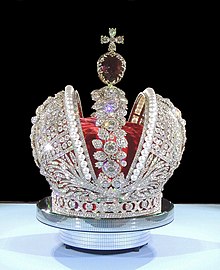Russian Crown Jewels
| Imperial Crown of Russia | |
|---|---|

Modern replica using real gems and white gold
|
|
| Heraldic depictions | |
 |
|
| Details | |
| Country | Russian Empire |
| Made | 1762 |
| Owner | Moscow Kremlin Diamond Fund |
| Weight | 4.08 kg (9 lb) |
| Arches | 2 |
| Cap | Red velvet |
| Notable stones | 4,936 diamonds 74 pearls 1 red spinel |
The Imperial Crown of Russia, also known as the Great Imperial Crown, was used by the Emperors of Russia until the monarchy's abolition in 1917. The Great Imperial Crown was first used in a coronation by Catherine II, and was last used at the coronation of Nicholas II. It survived the subsequent revolution and is currently on display in the Moscow Kremlin Armoury State Diamond Fund.
By 1613, when Michael Romanov, the first Tsar of the Romanov Dynasty was crowned, the Russian regalia included a pectoral cross, a golden chain, a barmas (wide ceremonial collar), the Crown of Monomakh, sceptre, and orb. Over the centuries, various Tsars had fashioned their own private crowns, modeled for the most part after the Crown of Monomakh, but these were for personal use and not for the coronation.
In 1719, Tsar Peter I the Great founded the earliest version of what is now known as the Russian Federation's State Diamond Fund. Peter had visited other European nations, and introduced many innovations to Russia, one of which was the creation of a permanent fund (фонд) to house a collection of jewels which belonged not to the Romanov family, but to the Russian State. Peter placed all of the regalia in this fund and declared that the state holdings were inviolate, and could not be altered, sold, or given away—and he also decreed that each subsequent Emperor or Empress should leave a certain number of pieces acquired during their reign to the State, for the permanent glory of the Russian Empire.
From this collection came a new set of regalia, including eventually the Great Imperial Crown, to replace the Crown of Monomakh and other crowns used by earlier Russian Tsars and Grand Princes of Muscovy, as a symbol of the adoption of the new title of Emperor (1721).
...
Wikipedia
